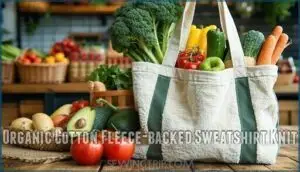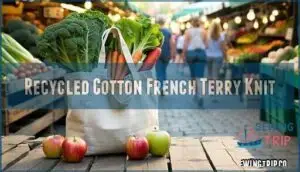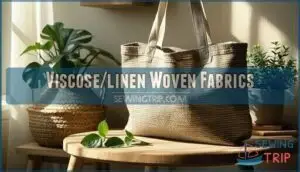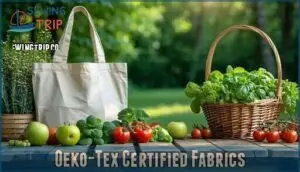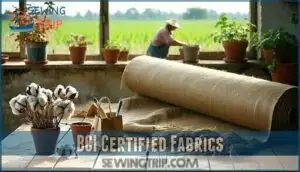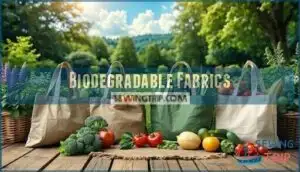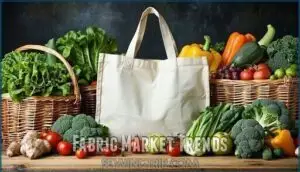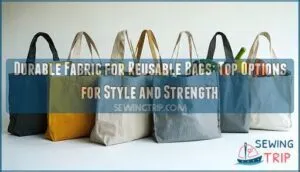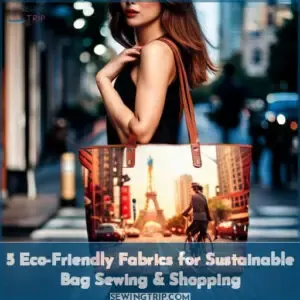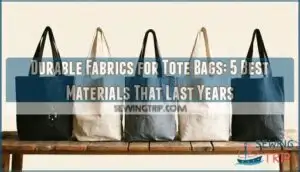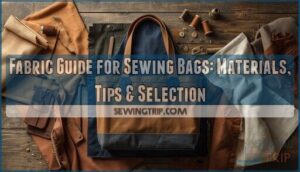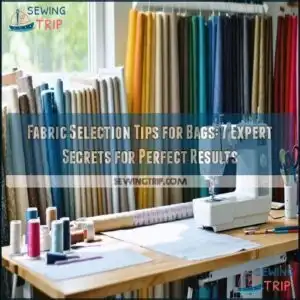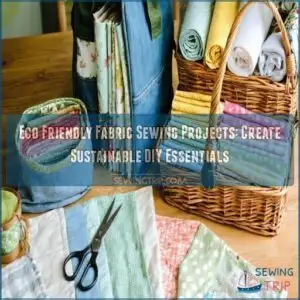This site is supported by our readers. We may earn a commission, at no cost to you, if you purchase through links.
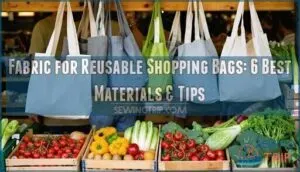
Canvas cotton and oxford weave fabrics handle 40+ pound loads without breaking a sweat, while lightweight options like jersey knits stretch and tear under normal grocery weight.
Canvas offers the sweet spot – it’s washable, naturally fights bacteria, and gets better with age rather than falling apart.
Oxford weave provides similar strength with a cleaner look that works from farmers markets to office runs.
Heavy-duty ripstop nylon takes the crown for waterproof durability, though it lacks the natural appeal of cotton options.
The secret lies in fabric weight and reinforced stress points.
Table Of Contents
Key Takeaways
- You’ll want canvas cotton or oxford weave for heavy loads – these materials handle 40+ pounds without tearing, while lightweight options like jersey knits fail under normal grocery weight
- Canvas offers the best all-around performance – it’s machine washable, naturally fights bacteria, gets stronger with age, and provides excellent durability for daily use
- Consider ripstop nylon for waterproof needs – it delivers superior moisture protection and extreme durability, though it lacks the natural appeal of cotton alternatives
- Focus on fabric weight and reinforced stress points – heavier weaves (12+ oz) with double-stitched seams and reinforced handles prevent catastrophic failures when carrying heavy groceries
Fabric Types Comparison
When choosing fabric for your reusable shopping bags, you’ll want to compare the strength, durability, and environmental impact of different materials.
The most popular options include cotton, canvas, jute, nylon, polyester, and recycled PET, each offering distinct advantages for carrying groceries and withstanding regular use.
Organic Cotton Fleece-backed Sweatshirt Knit
When shopping for eco-friendly fabric, organic cotton fleece-backed sweatshirt knit delivers unmatched cotton benefits for reusable shopping bags.
This sustainable fabric combines durability with comfort, featuring unique knit patterns that resist tearing while maintaining softness.
For a reliable source of organic materials, consider checking organic cotton suppliers to find the best fit for your needs.
| Property | Specification |
|---|---|
| Weight | 240-320g/m² |
| Width | 63-70 inches |
| Care | Machine wash 40°C |
The sweatshirt material’s fleece backing provides cushioning for groceries while the smooth exterior handles daily wear.
GOTS-certified eco textiles guarantee chemical-free production, making this fabric choice both practical and environmentally responsible for your shopping needs.
Recycled Cotton French Terry Knit
You’ll discover recycled cotton French terry knit transforms waste into winning reusable shopping bags.
This eco-friendly fabric combines sustainability with durability, offering moderate stretch and excellent moisture absorption.
The looped inner texture provides comfort while the smooth outer surface resists wear.
The fabric’s performance is also due to its french terry knit properties, which make it ideal for reusable shopping bags.
| Feature | Performance | Benefit |
|---|---|---|
| Weight | 200-350g/m² | Lightweight handling |
| Stretch | Moderate | Shape retention |
| Absorption | 20-25% | Moisture control |
Recycled materials reduce water usage by 765,000L per ton compared to virgin cotton production.
Terry knit construction delivers wrinkle resistance and easy care.
Fabric recycling eliminates pesticides and fertilizers while supporting circular economy principles.
Cotton benefits include breathability and biodegradability, making these sustainable fabrics perfect for eco textiles applications.
Viscose/linen Woven Fabrics
Blending viscose with linen creates versatile Fabric Weave options for eco-friendly fabric applications.
These Viscose Blends offer excellent breathability while maintaining structural integrity.
Linen Textures provide natural durability, making viscose linen woven materials ideal for recyclable bags.
| Property | Performance |
|---|---|
| Durability | High strength retention |
| Breathability | Excellent air flow |
| Sustainability | Biodegradable fibers |
| Texture | Smooth drape quality |
The Material Properties of these Woven Patterns combine viscose’s softness with linen’s resilience.
You’ll find sustainable fabrics perform exceptionally well as Reusable bag fabric, offering both comfort and longevity.
The use of viscose linen enhances the overall quality of the fabric.
Sustainable Fabric Options
When choosing sustainable fabrics for your reusable bags, you’ll find options that protect both your groceries and the environment.
Certifications like Oeko-Tex and BCI guarantee materials meet strict environmental and social standards while delivering the durability you need.
Oeko-Tex Certified Fabrics
When selecting reusable bag fabric, you’ll want materials that pass rigorous Textile Testing standards.
OekoTex certification guarantees your Fabric Safety by screening for harmful chemicals through their thorough Certification Process.
Here’s what makes certified Sustainable Materials stand out:
- Chemical-free dyes and finishes protect your health
- Rigorous testing eliminates toxic substances from production
- Eco Labels verify environmental responsibility throughout manufacturing
- Third-party verification confirms authentic ecofriendly fabric standards
- Consistent quality control maintains recyclable bags’ integrity
This certification transforms ordinary reusable bag fabric into trusted, sustainable materials you can count on.
By choosing fabrics with sustainable fabric options, consumers can make informed decisions about their environmental impact.
BCI Certified Fabrics
BCI certified fabrics follow Better Cotton Initiative standards that promote responsible cotton production.
When you’re sourcing sustainable materials for reusable bag fabric, BCI standards guarantee that farmers use water efficiently and care for soil health.
These eco labels guarantee your fabric for reusable shopping bags comes from cotton farms that protect worker rights.
BCI sustainable textiles reduce environmental impact while maintaining durability.
You’ll find eco friendly fabric options that meet these strict guidelines, making your ecofriendly fabric choice both ethical and practical for long-lasting shopping bags.
Biodegradable Fabrics
You’ll find biodegradable options offer peace of mind when your bag reaches end-of-life.
Organic cotton breaks down within five months, while hemp fabric bags decompose in three months. Jute provides 100% biodegradability with exceptional strength for heavy loads.
These green materials prevent microplastic pollution while supporting soil restoration.
- Hemp fabric bags resist UV damage and flames while biodegrading completely
- Organic cotton decomposes faster than synthetic alternatives by decades
- Jute cultivation actually improves soil quality without harsh chemicals
- Biodegradable bags eliminate fabric waste from landfills permanently
- Eco friendly fabric choices reduce your environmental footprint substantially
Top 6 Reusable Bags
You’ll find six proven fabric types that deliver the perfect balance of strength, sustainability, and practicality for your shopping needs.
These materials range from heavy-duty canvas to waterproof synthetics, each offering unique advantages for different shopping scenarios, with a focus on sustainability.
1. Reusable Grocery Shopping Tote Bags
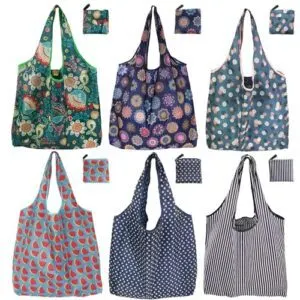
With ripstop nylon construction, these lightweight champions handle 50+ pounds of groceries while folding into a pocket-sized pouch.
You’ll replace 2-3 conventional bags with one durable option that won’t leave your arms aching thanks to widened handles.
The machine-washable fabric bounces back from heavy use, and six color varieties mean you’ll actually want to carry them.
Perfect for spontaneous shopping trips when you need something stronger than flimsy plastic but more portable than bulky canvas totes, making them a great portable option.
Best For: People who need a lightweight, space-saving alternative to bulky reusable bags for spontaneous shopping trips or those who frequently carry groceries by hand.
- Some users report stitching issues and expansion under maximum weight loads
- Not ideal for large weekly grocery hauls compared to heavy-duty canvas alternatives
- At $3 each, considered expensive by some users for what is essentially a basic bag
- Holds 50 pounds while folding into pocket-sized pouch for ultimate portability
- Widened handles distribute weight evenly, reducing hand and arm strain during transport
- Machine-washable ripstop nylon construction withstands heavy use and bounces back from washing
2. Reusable Grocery Bags With Zipper
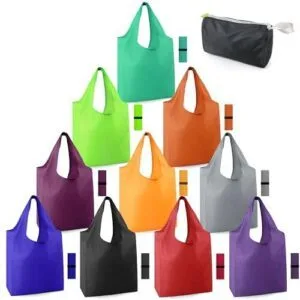
Adding zippers to your reusable grocery bags transforms them into secure storage powerhouses.
Zipper closures prevent spillage during transport and add organization with separate compartments for keys, phones, or receipts.
You’ll find polypropylene and poly-cotton blends dominate zipper bag construction, combining water resistance with breathability.
These materials handle heavy loads while remaining lightweight and dishwasher-safe.
Zipper bags cost more upfront but deliver measurable savings by replacing hundreds of single-use plastics over their lifetime, providing multi-use versatility.
Urban shoppers especially value the security and multi-use versatility these bags provide.
Best For: Urban shoppers and eco-conscious consumers who need secure, multi-functional bags for grocery shopping, outdoor activities, and everyday transport with spillage prevention.
- Higher upfront cost compared to basic reusable bags without zipper features
- Some users find folding and storage more difficult than simple tote-style bags
- Slightly heavier than non-zipper alternatives due to additional hardware and reinforcement
- Zipper closure prevents spillage and adds security for groceries and personal items during transport
- Made from durable materials like polypropylene and poly-cotton blends that are water-resistant and dishwasher-safe
- Long-term cost savings by replacing hundreds of single-use plastic bags over their lifetime
3. Heavy Duty Reusable Grocery Bags
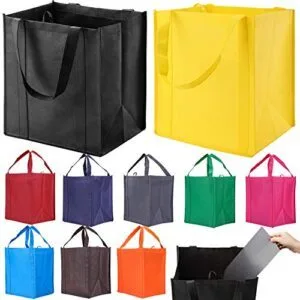
When you need bags that won’t quit, heavy-duty reusable grocery bags deliver serious strength.
These workhorses typically use non-woven polypropylene or canvas construction, supporting 40-100 pounds without breaking a sweat.
You’ll find reinforced handles sewn to the bottom, preventing that dreaded rip when you’re carrying milk cartons and canned goods.
The thick removable plastic bottom insert keeps everything upright and organized, and with double-stitched seams and wrap-around straps, these bags handle your heaviest shopping trips while lasting years of regular use.
Best For: Heavy-duty shoppers who need reliable bags that handle substantial weight loads, frequent grocery trips, and multi-purpose carrying without failing.
- Bulkier storage compared to lightweight alternatives due to reinforced construction and thick materials
- Higher upfront cost than basic reusable bags, though offset by superior longevity
- Some models may have shorter handles that limit comfortable shoulder carrying for extended periods
- Exceptional durability with reinforced handles and double-stitched construction that supports 40-100 pounds safely
- Structured design with removable plastic bottom inserts keeps bags upright and prevents sagging during loading
- Machine washable and eco-friendly construction from recycled materials offers long-term value and sustainability
4. Reusable Large Grocery Shopping Bags
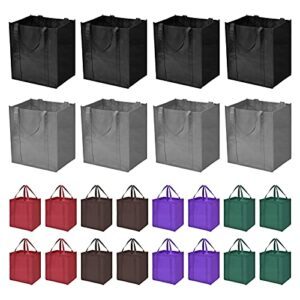
When you’re hauling a week’s worth of groceries, these extra-large powerhouses measure 15–19 inches wide and 13–16 inches tall.
You’ll carry up to 50 pounds without breaking a sweat, thanks to reinforced handles and double-layered bottoms.
They’re like having a grocery cart in bag form.
Interior compartments separate your delicate tomatoes from heavy canned goods, while foldable designs tuck away neatly until your next shopping adventure.
Best For: Families and bulk shoppers who need durable, spacious bags to handle heavy grocery loads while reducing plastic waste.
- Hold up to 50 pounds with reinforced handles and double-layered bottoms for maximum durability
- Interior compartments keep delicate items separated from heavy goods during transport
- Foldable design stores compactly and can replace hundreds of single-use plastic bags annually
- Nonwoven fabric requires hand washing only, making maintenance more time-consuming
- Some users find the material too thin for quick grocery bagging compared to rigid alternatives
- Initial cost of $1.25 each adds up when purchasing multiple bags for large households
5. Reusable Large Cotton Canvas Tote
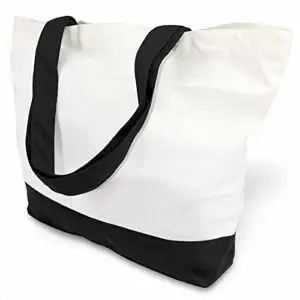
When shopping for groceries becomes a weekly workout, you’ll appreciate cotton canvas tote bags that won’t quit on you.
These workhorses feature 12oz cotton canvas construction with dimensions of 18.5"L x 4.72"W x 15"H, offering serious strength for heavy loads.
Cross-stitched handles measuring 1.4" wide provide comfortable grip distribution.
They’re machine washable with minimal 5% shrinkage and come with a one-year warranty.
Perfect for customization projects or everyday hauling.
Best For: People who need durable, versatile tote bags for heavy grocery shopping, crafting projects, or daily use who value eco-friendly alternatives to plastic bags.
- Requires approximately 7,100 uses to offset environmental impact compared to plastic bags, making initial carbon footprint significant
- Some users report the bag is smaller than expected and may need ironing after washing for crisp appearance
- Price is 60% higher than comparable polyester cotton alternatives of the same weight
- Heavy-duty 12oz cotton canvas construction with reinforced cross-stitched handles can withstand heavy loads and repeated use
- Machine washable with minimal shrinkage and comes with a one-year replacement warranty for peace of mind
- Versatile for multiple uses including shopping, crafting, customization projects, and stands upright independently
6. Reusable Waterproof Grocery Shopping Bags
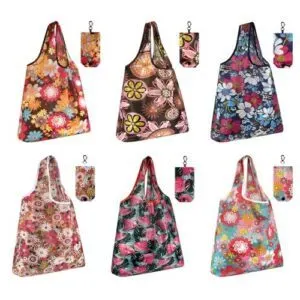
Waterproof grocery bags use synthetic fabrics like polypropylene, polyester, and nylon that repel moisture while maintaining durability.
These materials can hold up to 65 pounds and replace over 1,000 disposable bags during their lifetime.
You’ll find coated ripstop nylon offers water resistance up to 1,500mm, while laminated fabrics combine polymer films with textiles for enhanced protection.
PEVA and recycled PET options provide eco-friendly alternatives without sacrificing performance, they’re machine washable, fold compactly, and feature reinforced bottoms to prevent spills during transport.
Best For: Eco-conscious shoppers who need durable, compact bags that can handle heavy loads while protecting groceries from moisture during transport and storage.
- Higher upfront cost compared to disposable plastic bags, though offset by long-term reusability
- Some synthetic materials like polypropylene and polyester may feel less premium than natural fabric alternatives
- Requires regular cleaning and maintenance to preserve waterproof coating effectiveness over time
- Exceptional durability with 65-pound capacity and ability to replace over 1,000 disposable bags during their lifetime
- Superior water resistance up to 1,500mm with coated ripstop nylon and laminated fabric options that protect groceries from moisture
- Compact portability with foldable design, machine washable materials, and reinforced bottoms that prevent spills during transport
Fabric Market Trends
You’ll find the reusable shopping bag market is experiencing remarkable growth, with the US market projected to reach $354.4 million by 2031 at a 5.9% annual growth rate.
This surge stems from eco-conscious consumers increasingly preferring biodegradable materials like cotton and canvas, which they associate with superior quality and environmental benefits, driven by the perception of superior quality.
US Reusable Shopping Bag Market Growth
The market numbers tell a compelling story.
Reusable bags aren’t just replacing plastic—they’re reshaping how America shops forever.
You’re witnessing explosive growth in reusable bags, with the US market hitting $354.4 million by 2031 at a 5.9% growth rate.
This surge reflects changing consumer priorities and regulatory pressure on single-use plastics.
Market Growth Drivers:
- Corporate sustainability initiatives incorporating branded canvas tote bags
- Plastic bag bans boosting cotton shopping bags adoption
- Consumer demand for earth friendly bags increasing rapidly
- Biodegradable bags gaining mainstream acceptance
- Growth projections showing consistent upward momentum across bag materials
Eco-conscious Consumer Demand
You’re witnessing a major shift in consumer behavior as environmental awareness drives purchasing decisions.
Green marketing campaigns highlighting sustainable living have made eco bags fabric a selling point, not just an afterthought.
Today’s shoppers actively seek earth friendly bags and biodegradable bags that align with their values.
This eco trends movement means you’ll find consumers willing to pay premium prices for ecofriendly reusable bags that reduce their carbon footprint.
Reusable Bag Material Preferences
Consumers increasingly favor natural fibers like cotton and jute shopping bags over synthetic alternatives.
Material Selection drives purchasing decisions, with hemp fabric bags and eco bags fabric commanding premium prices.
Bag Durability matters—thick polypropylene requires fewer reuses than cotton to offset environmental impact.
Fabric Weight of 120+ GSM guarantees quality standards.
Smart shoppers recognize Reuse Patterns affect Eco Benefits, choosing shopping bag materials from bag fabric wholesale suppliers accordingly.
When selecting materials, considering the fabric durability factors is vital for making informed decisions.
Choosing Best Fabric
When you’re selecting fabric for reusable shopping bags, you’ll want to balance durability with environmental responsibility.
The best materials combine tensile strength to handle heavy groceries with sustainable production methods that align with eco-conscious shopping habits.
Durability and Strength Considerations
Strong grocery bag materials need proper evaluation through fabric density and tensile strength testing. You’ll want materials that won’t leave you holding groceries instead of bags when heading home from the store.
Key durability factors for shopping bag materials include:
- Material Testing – Lab tests measure how fabrics perform under real-world conditions
- Fabric Density – Heavier weaves typically offer better wear resistance
- Tensile Strength – Determines maximum weight capacity before tearing
- Tear Resistance – Prevents small rips from becoming catastrophic failures
- Wear Resistance – Maintains strength through repeated folding and handling
Canvas and heavy cotton score highest for durability, handling 30-50 pounds repeatedly. Polypropylene offers excellent strength-to-weight ratios but less tear resistance than woven options. Nylon provides superior tensile strength but costs more.
Consider your typical shopping loads – lightweight users can choose thinner materials, while heavy shoppers need robust fabric for reusable shopping bags that’ll last years. When selecting materials, consider the importance of durable bag materials to guarantee longevity and performance.
Environmental Impact Factors
Every fabric choice you make carries environmental consequences beyond its lifespan.
Cotton reusable bags must be used 131 times to offset their carbon footprint compared to single-use plastic, while polypropylene needs only 11 uses for waste reduction.
Your sustainability journey depends on understanding these eco benefits.
Recycled materials like rPET cut greenhouse gas emissions by 70% and divert plastic from landfills.
Biodegradable options such as hemp and jute support green initiatives through minimal water usage and natural decomposition.
Choose environmentally friendly fabrics that align with your ecocscious values—recycling agricultural waste into banana fiber bags exemplifies sustainable living innovation that’s both practical and planet-friendly.
Considering the benefits of sustainable fabrics can greatly impact your decision when selecting materials for reusable shopping bags.
Frequently Asked Questions (FAQs)
What is the best material for reusable shopping bags?
Looking for material that’ll handle your weekly grocery hauls without tearing? Cotton and canvas offer the best balance of durability, sustainability, and strength for reusable shopping bags that last.
What are grocery store reusable bags made of?
Most grocery store reusable bags are made from polypropylene (woven or non-woven), cotton canvas, polyester, or recycled materials like rPET.
You’ll find polypropylene dominates since it’s durable, water-resistant, and cost-effective for mass production.
What is the best fabric for reusable bread bags?
Preserving your daily bread’s freshness becomes effortless when you choose unbleached cotton or linen fabric.
You’ll want breathable, natural fibers that allow moisture to escape while protecting against contaminants, ensuring your loaves stay fresh longer without trapping humidity, using natural fibers.
How much weight can fabric shopping bags hold?
Most fabric shopping bags hold 15-25 pounds comfortably, though heavy-duty canvas or nylon versions can handle up to 50 pounds.
Cotton bags typically support lighter loads, while reinforced handles and seams boost capacity substantially.
Which fabrics resist water and moisture best?
Waterproof wonders work wonders!
Nylon and polyester naturally repel moisture, while canvas and cotton require waterproof coatings.
You’ll find synthetic fabrics like polypropylene offer superior water resistance for wet-weather shopping adventures, with polypropylene being a notable example.
How do you wash different bag fabrics?
Machine-wash cotton bags in cold water with mild detergent.
Hand-wash jute and canvas bags to prevent shrinking.
Polypropylene and nylon bags wipe clean easily with damp cloth.
Always air-dry completely before storing.
What fabric thickness works for grocery bags?
You’ll want bags that can haul groceries without tearing under weight.
Choose medium-weight fabrics like 12-14 oz canvas or 600-denier polyester – thick enough for durability, light enough to carry comfortably when loaded.
How long do various bag fabrics last?
Professional canvas tote bags typically survive 2-3 years of weekly grocery runs.
You’ll find cotton bags lasting 1-2 years, while polypropylene handles 3-5 years of heavy use, and jute manages about 18 months before showing wear.
Conclusion
Like a ship choosing the right sail for stormy seas, selecting proper fabric for reusable shopping bags determines whether you’ll reach your destination with cargo intact.
Canvas cotton delivers unmatched durability with its 40+ pound capacity and natural antibacterial properties.
Oxford weave provides professional aesthetics while maintaining strength.
Ripstop nylon offers waterproof protection for unpredictable weather.
You’ll find success by prioritizing fabric weight, reinforced stitching, and washability when choosing fabric for reusable shopping bags that’ll serve you for years.
- https://www.businessblogshub.com/2017/10/the-five-common-materials-used-to-manufacture-reusable-grocery-bags/
- https://suffolkcountyny.gov/Portals/0/FormsDocs/health/PublicHealthProtection/Website%20Enviromental%20Impactsv3.pdf
- https://www.cityofnapa.org/Faq.aspx?QID=169
- https://collegeofglobalfutures.asu.edu/wp-content/uploads/2024/06/Choosing-a-Sustainable-Grocery-Bag-Narratives-1.pdf
- https://www.reusethisbag.com/articles/what-are-the-different-types-of-reusable-bags

